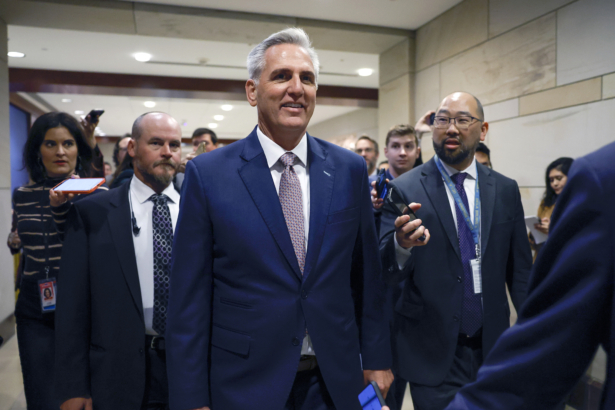House Republicans passed the first round of several expected rule changes on Nov. 17.
The conference addressed 12 of 24 proposed rule changes put forward by GOP members (pdf).
Republicans, who will take control of the House in January 2023, are leaving more controversial rule changes for consideration after Thanksgiving.
Several of the rules proposed serve to weaken the power of the speaker as many Republicans remain lukewarm about the prospect of a Speaker of the House Kevin McCarthy (R-Calif.).
Easier to Remove a Speaker
One of the new rules passed by the conference would make it easier to remove a sitting speaker.
Specifically, the rule allows a majority of the GOP caucus to vote to remove the speaker. Currently, the speaker’s seat can only be vacated following a motion from the House majority leader.
Under the new rule, put forward by Rep. Mike Turner (R-Ohio), any member can put forward a motion to depose the speaker. A majority of the conference must then agree to the motion before it can go to a vote.
The Turner amendment states that: “It is the position of the Republican Conference that the privilege under House Rule IX Clause 2(a)(3) should only be available with the agreement of the Republican Conference so as to not allow Democrats to choose the Speaker.”
The effects of this rule are two-fold.
First, the rule heads off the threat of Democrats being able to place their own pick in the speaker’s chair.
Though Republicans are in the majority, and have put forward their own nominee for speaker—current House Minority Leader Kevin McCarthy (R-Calif.)—Democrats also will put forward a candidate for speaker.
Some Republicans have expressed concerns that if Democrats put forward someone like Rep. Liz Cheney (R-Wyo.), Democrats may be able to win enough cross-aisle support to deprive Republicans of their pick for the top House spot.
Despite Cheney’s defeat in her primary earlier this year, the Constitution does not require that the speaker be a sitting, elected member of Congress.
The other effect of the rule change will be to reduce the power of a potential Speaker McCarthy.
Though he won his party’s nomination for the speakership on Nov. 15, McCarthy faced opposition from Rep. Andy Biggs (R-Ariz.). McCarthy got 188 GOP votes for the nomination to Biggs’s 31.
Other Republicans, including Reps. Chip Roy (R-Texas), Matt Gaetz (R-Fla.), and Bob Good (R-Va.) also opposed McCarthy.
Still, McCarthy remains the frontrunner for the spot. With the Turner amendment, Republican critics of McCarthy will have a tool to rely on if McCarthy fails to meet their expectations.
The Turner amendment, Rep. Don Bacon (R-Neb.) said, “[makes] it so you have to have the majority of the conference to vacate the chair,” reported the Washington Examiner,
He added, “That’s good because it gives you stability. You don’t have a gun to the speaker’s head on every vote.”

Spending Bill Rule Amendment Fails
Other amendments, including several put forward by the House Freedom Caucus (HFC), failed to garner enough support.
One rule amendment put forward by Good would have required the speaker to win the support of a majority of the GOP conference for spending bills before they can come to a floor vote. This rule, called the “majority of the majority” rule, would give conservative Republicans a tool to ensure McCarthy’s good behavior.
After the closed-door meeting, Good reported dissatisfaction with how leaders were treating proposed rule changes.
“I don’t think those of us who are seeking to change how Congress operates felt like the leadership was supportive of that,” Good told reporters. “It was clear that the conference leadership had lined up opposition to go to the mic to talk to—to talk against every rule proposal, every change that we put forward, or just about every one.”
In an impassioned speech on the House floor, Roy, a member of the HFC, argued for the importance of these rule changes.
“The only way we’re gonna make this the end of an era is if we change the way we do things,” Roy said.
“We have to change the way this town works.”
Changing the rules, Roy contended, is important because in the past the rules have served to weaken the effectiveness of individual members—and thereby to reduce the power of their constituents.
Leaders “want power,” Roy said, but they don’t “want to look in the mirror and change a broken town, a broken government, a broken House.”
HFC Chairman Rep. Scott Perry (R-Pa.) echoed Roy’s comments in an interview with The Epoch Times.
“We want a participatory process. You will hear me say occasionally that we have this illusion of representative government,” Perry told The Epoch Times in a previous interview.
“The people think they send their member of Congress to Washington … and their member is involved in negotiation and amendments, but it couldn’t be further from the truth. We are voting ‘yes’ or ‘no’ on bills that we’ve never seen before the day they come to the floor. It’s wholly unacceptable.”

Other Changes
Some measures by the HFC were more successful, however.
A move to increase the size of the GOP steering committee, which handles committee assignments, was successful. Under the new rules, the number of regions represented on the committee will be raised from 11 to 19.
The move gives GOP members more power over committee assignments, again at the expense of McCarthy’s power.
The Republican conference also approved a rule change from Rep. Gary Palmer (R-Ala.).
Palmer’s amendment would require that bills exceeding $100 million not be passed under suspension of the rules. When rules are suspended, usually for non-controversial bills, a bill must win two-thirds of the House’s support to pass.
The $100 million cap was reduced from $250 million in Palmer’s original proposal.
Another measure put forward by Rep. Andrew Clyde (R-Ga.) that would reopen Capitol grounds and the House floor was also approved. That rule would repeal mask mandates, tour restrictions, and other COVID rules put in place by the Democrat majority.
The votes on Nov. 17 only accounted for half of the proposed changes.
As Congress is preparing to go onto its Thanksgiving recess, the other rule changes will not be considered until after the break.
From The Epoch Times
